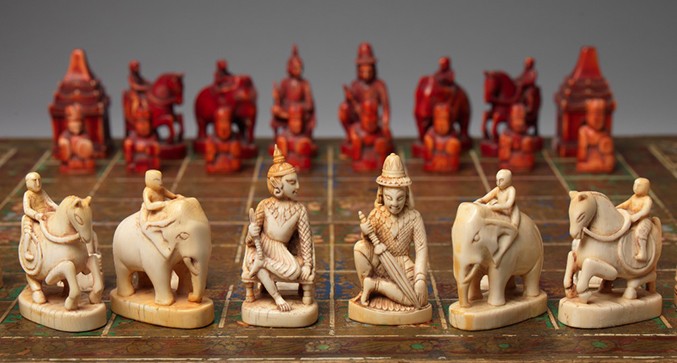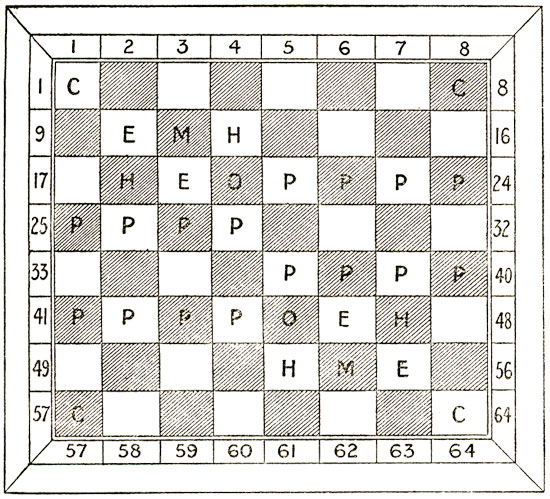Culture
Myanmar Chess
- Details
- Hits: 4089
 Myanmar Chess
Myanmar Chess
Photo Credit - www.mauradibartolo.com
Chess is one of the games that is well-known and played around the world. And in Myanmar. we have our own significant traditional chess game. Since ancient times. the Myanmar people were very keen and fond of playing traditional chess. In fact. Myanma traditional chess in based on four warfare elements. which were show in old Myanmar military text and scriptures.
Four military elements are:
(1) Elephant division
(2) Cavalry division
(3) Chariot division
(4) Infantry division
Myanmar chess which is based on these four warfare elements. so it is represented by elephant figure. horseman figure. chariot figure. and footsoldier figure with the knight commander figure who command all these four warfare element and finally king ( warlord ) figure. In all. there are six types of figures. Because Myanmar Chess in based on the four warfare elements. normally called Sit-Tu-Yin.
Myanmar Chess Board

| No. of Pieces | Name of Piece | Symbol | Position of Square | |
| Black | White | |||
| 2 | Chariots | C | 1, 8 | 57, 64 |
| 2 | Elephants | E | 10, 19 | 46, 55 |
| 2 | Horses | H | 12,18 | 47,53 |
| 1 | Minister of State | M | 11 | 54 |
| 1 | Officer | O | 20 | 45 |
| 8 | Pawns | P | 21 to 28 | 37 to 44 |
In Myanmar Chess, there are eight foot-soldiers figurines which represent eight infantry division for each side, so that both side ( two players ) can play vigorously, subsequently there are two chariot figures for two chariot division, two elephant figures for two elephant division. Two horseman figures for two cavalry division. One Commander ( or ) knight commander figure and finally one king ( Warlord ) figure. So, each side has 16 figures, totaling 32 figures for both sides ( for two players ). These figures are made from hardwood which Myanmar is famous for Teak;
Sometimes, these figures are carved out of the horns of the bull bisons and ardorned with white and black colours. Figures carved from ordinary wood are differentiated for two sides by painting them red and black.
Woodcarvings are about 2 to 3 inches in height. In ancient time all these figurines were carved very precisely. Infantry soldier figures are curved clearly and with helmets called “Mout-Toe” in Myanmar. (This helmet is specially meant for other rank soldiers “Mout-Shay” is a helmet for officers and commanders.) Cavalry figure is a horse riding by a worrier and sometimes adorned with rein and other accessories completely. Elephant figure is in a form of elephant which is bigger than horses. Chariot figure has a wheel and a roof carved in sideway. Commander or knight commander figure is carved in a kneeling form with a sword is carrying on his shoulders, and the king figure is carved per feetly in a from of sitting in the crossleg position and a “Than-Lyett” (royal short knife, which only kings are allowed to carry.)
In this era, figures are carved only to know and differentiate the form and type, but not in detail.
There are eight squares in length and eight squares in breath at Myanmar chessboard, same as the cheeker-board, altogether, here are 64 squares.
Each side has 32 squares, 16 squares for the figures an the rest 16 squares are for movement. There’s no colours to differentiate all the squares have the same colour.
Two straight lines are drawn across from all four corners. These two straight lines are coverage at the center of the chess-board and called “ Sit-kei-kyo”
After the commander has annihilated, and one of the infantry soldier has come upon this straight line, this infantry soldier has a right to become a commander. Only infantry soldiers have the right to become a commander, other such as elephant, cavalry or chariot cannot become a commander. The aim and objective of the two sides is to attack and paralyze the opponent king. This king of attack is called “ kwei” which is the same as calling “ chockmate” when the king is paralyzed, and the other side is defeated and the game is won, no matter how many figures are left.
Infantry soldiers can move only one step (or one square) forward straight, it cannot move backwards. Any opponent figure standing on the squares at the left or right sides angles can be eliminated. If it does not want to eliminate the opponent figure, it can ignore it. Cavalry horse man can hop over if their isn’t a path and can move left, right, front and backwards for & squares. Laxly horseman cannot move to the square where there is other figure of his own sides, but can eliminate any opponent figure and stand on that square.
Never the less, it cannot stand together with an opponent figure on the same square without elimination. Elephants move straight forward, or diagonally backwards or forwards, and each move is only square. Elephant cannot move straight backwards, or straight sideways chariot is most powerful in Myanmar Chess. If there’s no buffer figure, they can be move freely, either forward, backward, right or left. So they assumed chariot owns 14 squares. Commanders can move only two squares, either to front angle or backwards angle. The King can move only one square to any direction.
In Myanmar Traditional chess the horseman is a powerful figure. If the horseman falls, the player will be inconsolable as the horseman can eliminate other figures and the only figure, which can checkmate the king. The horseman figure can be moved about, just like the international chess moves. If you haven’t checkmate the king and he cannot move anymore and he’s at a standstill, you have “Kwet” or still mate the king.
Initially placing the figures is teemed “ Warfare preparation ” and this plays a vital role in playing. It will also justify who wins and who loses. That is why only a skilled player can survive.
In ancient days, people like to hide their strategic skills so they used to draw a curtain between each other. When placing the figurines. It is just to keep this strategy in low profile.
The curtain is removed, only when the initial move is to be alone. The positions are revealed soon as the curtain is raised. In the good old days, those skilled personnel’s process the talent of justifying or predicting the win and the loss by merely glancing at the position before the play. Some used to concede by just looking at the position without a single move. That is one of the peculiarities of Myanmar Sit-tu-yin.
In playing Sit-Tu-Yin, there is defence and attack, which is called the 8 strategies of warfare preparation.
They are as follows:
(1) Min Pone
(2) Myin Set
(3) Myin Shin
(5) Myin Cheik
(6) MyinHtat
(7) Atwin Sit Ke Pauk
(8) Sin Shin Myin Kwae
Playing Chess, you will be using all your intellectual skills. And besides the benefits of gaining more intelligence, more concentration power and you will also gain
(1) Idealism
(2) Cautiousness
(3) Concentration
(4) Strong will
(5) Skillfulness
(6) Cleverness
On Starting the move, the player with the red figurines has the chance to move first portraying the attack and the second player with the black pieces is said to be on the defensive regardless of the position or strategy the latter had laid down.
Attacking by a “Myin-Pone”, will be defended by “Myin-Set” is retaliated by Myin-Shin, step-by-step defense and attack is monopolized with the individuals intelligence and ideas to clinch the victory. By playing Myanmar chess you can gain all the above-mentioned benefits. So, we hope after seeing our program you will enjoy playing Myanmar chess. That is our anticipation.




